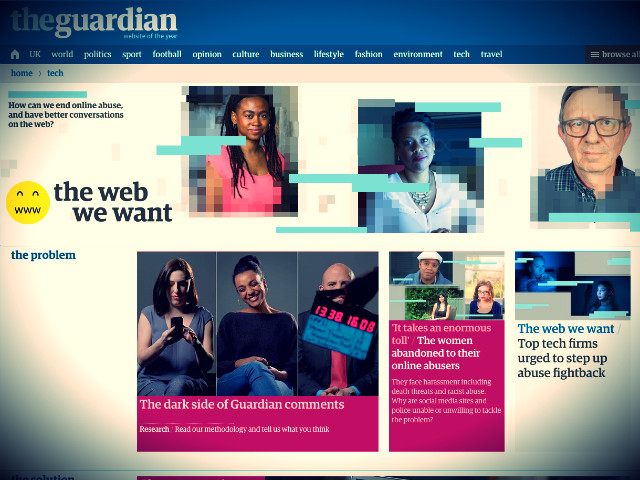The Guardian newspaper has launched a new section of its website entitled: “The Web We Want”, a series focusing on the question, “How can we end online abuse, and have better conversations on the web?”
This follows on from January, when the readers’ editor Stephen Pritchard announced that because “certain subjects – race, immigration and Islam in particular – attract an unacceptable level of toxic commentary” comments would no longer be open on articles related to these topics – unless multiple moderators are available and only where they believe a “positive debate” is possible.
This means that for many controversial pieces which the Guardian fears will attract negative reader reaction – including articles about feminism – commenting is now disabled.
In order to understand more about below-the-line comments, with a view to “limiting abuse”, the Guardian analysed “patterns of moderation” in the comments over the years. The data revealed which writers’ articles attracted the most “blocked comments” — ones regarded by moderators to be “abusive or disruptive” and so deleted.
In an article entitled “Comments on articles are valuable. So how to weed out the trolls?”, Joseph Reagle considers commenting systems on other websites and outlines what he thinks they get right and wrong. He points to Breitbart.com, which uses the Disqus comment system that permits moderation, flagging and voting, as an example of what he deems a website with a “lousy” comments section, claiming the section contains “many displays of violent racism and sexism”.
This is far from the only time comments on the internet are equated with physical violence and harm, conflating “safety” with insulation from “abusive” remarks is a running theme through this series. One article compares internet trolling and name-calling to adulterated food and advises that moderators on the internet can learn from how the Victorians dealt with widespread food contamination, both equally considered by the author as matters of “public safety”.
In “The dark side of Guardian comments”, feminist columnist Jessica Valenti discusses her definition of “abuse”, citing comments such as “I can’t believe you get paid for this”, and “you suck”. Comments which other people would just consider to be exasperated criticism, not abuse.
Writing that she is “the Guardian contributor most targeted online” Ms. Valenti posits “the mere act of writing about women’s issues sets off a stream of harassment and threats” and says women are targeted for targets of “abuse” simply because they are women.
However this claim fails to acknowledge her history of writing articles such as the provocatively-titled, “Feminists don’t hate men. But it wouldn’t matter if we did”, and in July 2014 posing at the beach, grinning, arms outstretched, while wearing a shirt emblazoned with the words, “I bathe in male tears.”
I took a special picture for all the misogynist whiners in my feed today. #bestvacationever pic.twitter.com/gvFgn3ahri
— Jessica Valenti (@JessicaValenti) July 30, 2014
Many of the articles in this series cite that of the ten writers who attracted the most “abuse” eight are women (four white and four not white) and that the two remaining men are black, implying that sexism and racism is a motivating factor according to the contributors.
In 2014 the Daily Beast reported that a large survey of internet users, by the Pew Research Centre, showed that men get harassed online more than women.
Revealingly, however, below the line many of the comments with the most “recommends” — clicks of approval from other readers — identify the problem instead as being that the writers in question focus on identity politics and, one person writes, “are often deliberately provocative towards men, and whites”.
So whilst The Guardian has ‘freed’ some of its comment, only as the series progresses will readers engaging in this “positive debate” find out whether this regained freedom will result in more personal robustness of Guardian contributors, or the iron gate will be shut down again, in face of so-called “abuse”.

COMMENTS
Please let us know if you're having issues with commenting.